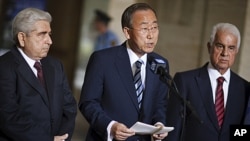U.N. mediated talks have failed to achieve an agreement to reunify the divided island of Cyprus. This is the third time since November the Greek and Turkish Cypriot leaders have met to try to resolve this decades-old problem without success.
U.N. Secretary-General Ban Ki-moon, who mediated this latest round of negotiations, is an unfailing optimist. But even he acknowledges progress in healing the divisions of the island is far too slow.
He says negotiators from the Greek and Turkish Cypriot sides have worked steadily to move ahead since the last meeting in January. Despite this, he says some important areas still have not been touched.
"For this reason, today's meeting has been useful and productive," said Ban. "We have identified some of the difficulties that are standing in the ways of reaching a comprehensive agreement, and we have discussed the need to significantly intensify the negotiations. I have also raised with both leaders the importance of looking ahead at the objective rather than focusing on the problem in minute detail."
Ban says he is impressed with, what he calls, the commitment on both sides to agree on the details to create a united Cyprus.
Cyprus has been divided since Turkey invaded the island in 1974 following a Greek-inspired coup. Thousands of Turkish and Greek Cypriots fled their homes.
Repeated negotiations throughout the succeeding years have failed to achieve a political settlement to bring the two separate communities together. The major issue of contention concerns property rights. A diplomatic solution as to how to reinstate ownership rights to the thousands of people who were forced to abandon their property has not been found.
Other core issues include governance and power sharing, economy, territory and security, citizenship, and European Union membership. The Greek Cypriot part of the island is an EU member, the Turkish part is not.
This is an ongoing bone of contention between the two sides. It also poses problems for Turkey, whose membership aspirations are tied to the re-unification of Cyprus.
Secretary General Ban says the Greek and Turkish Cypriot leaders have agreed to intensify their negotiations on the core issues when they return to the island.
"I have every expectation that by October the leaders will be able to report that they have reached convergence on all core issues, and we will meet that month in New York," added Ban. "This will take the Cyprus negotiations close to their conclusion and would allow me to give a positive report to the Security Council on the matter. It would also pave the way for me to work with the parties towards convening final, international conference."
Ban says people on both sides of the divide are weary of these endless negotiations. He urges both leaders to renew hope and enthusiasm for a solution.
Some analysts believe the prospect of the Greek Cypriots taking over the six-month rotating EU presidency a year from now might act as an incentive to seal a deal.
Cyprus Reunification Still Stalled
- By Lisa Schlein




